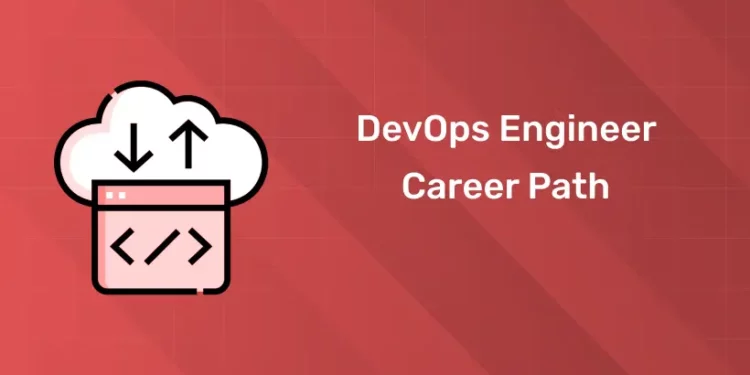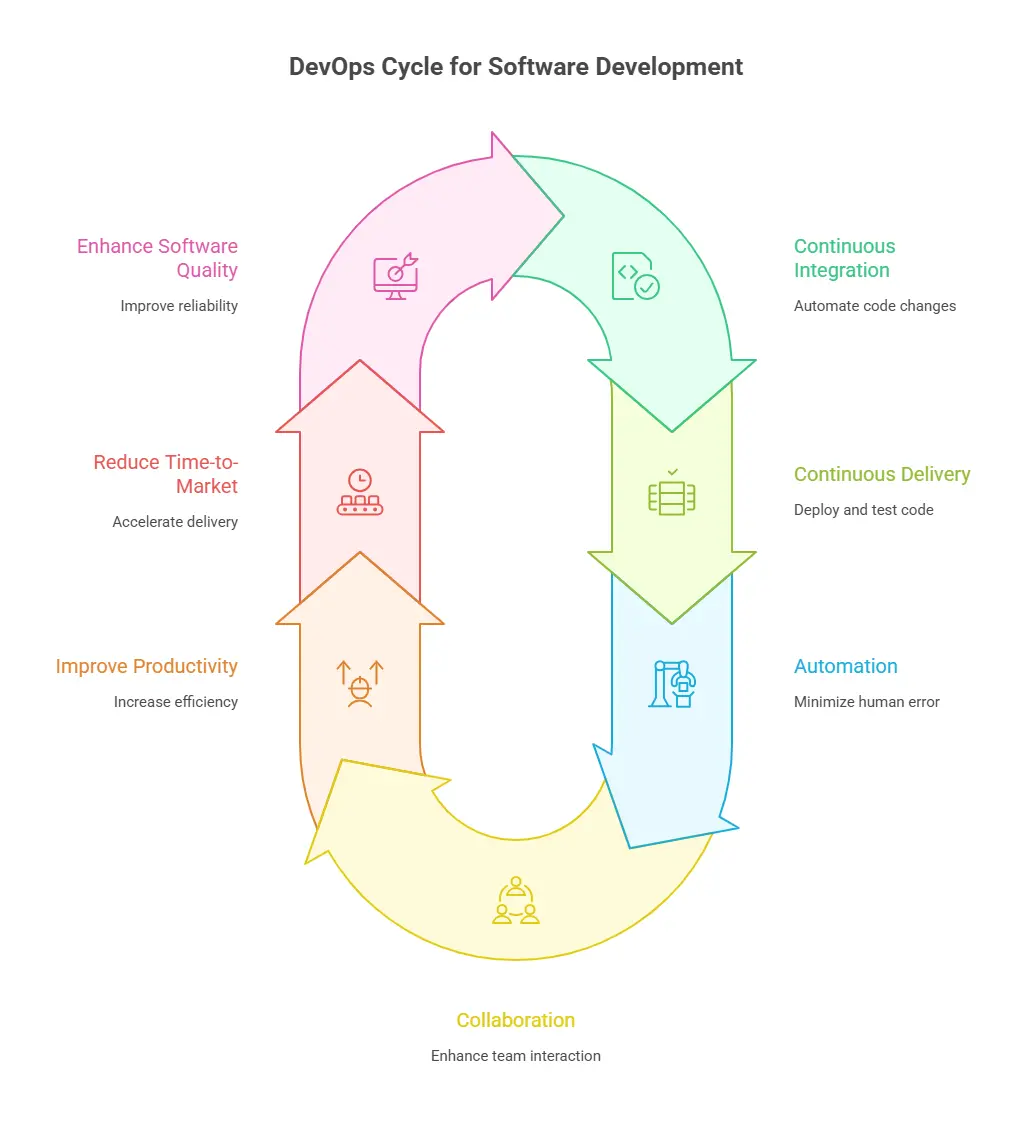Table of Contents
In today’s fast-paced world of software creation, DevOps is one of the skills that people want the most. It puts together IT management and software development to make software releases faster and more effective. This is done through automation, CI/CD, and real-time teamwork. As more and more companies use cloud platforms and fast methods, the need for DevOps experts has grown in all fields. Recent hiring trends in tech show that DevOps jobs are some of the best-paying and most stable for the future. What steps can a DevOps engineer take to achieve their career goals? Let’s look into it one step at a time.
Learn to code from industry experts! Enroll here
What is DevOps?
DevOps is a practice, tool, and cultural approach to bridging the gap between IT operations (Ops) and software development (Dev). Its purpose is to reduce the software development life cycle while delivering features, patches, and updates in short cycles near business goals. It is aimed at the collaboration of operation teams and developers in order to scare away the traditional silos and create seamless delivery.
Core Principles—CI/CD, Automation, Collaboration:
Embedded at the core of DevOps are some fundamental principles such as Continuous Integration (CI) and Continuous Delivery (CD) that automate deploying and testing of code changes. Automation plays an important role in minimizing human error and accelerating process—code building, testing, and deployment. Collaboration also has the extra advantage of having developers, testers, and operations staff interact closely, which leads to mutual responsibility, quicker feedback, and improved product results.
Why Companies Adopt DevOps?
Firms implement DevOps in order to enhance productivity, save time-to-market, and increase the quality of software. DevOps enables firms to release code sooner and more securely, quickly respond to the market, and cut downtime. With the ability to quickly respond to customers’ requirements with constant system stability, firms get a competitive advantage in the fast-paced digital era.
Why Choose a Career in DevOps?
1: Which of the following data structures allows elements to be added and removed in a Last-In, First-Out (LIFO) order?
High Demand & Salary
As more businesses use fast and cloud-based tools, there is a high demand for DevOps workers in all fields. Because of the high demand, DevOps is now one of the best-paying IT jobs. Reports from the business world say that skilled DevOps engineers get good pay. In India, mid- to senior-level jobs often pay over ₹18–25 LPA, and they can make even more abroad.
Why it’s important:
- Experts in DevOps are needed for fast digital change
- Demand that stays the same across companies, businesses, and global tech firms
- Great pay raise as you gain experience and certifications
Opportunities to Work Across Development and Operations
As a DevOps professional, you don’t just write code or run computers. It gives you the special chance to work on all stages of the software process, including testing, release, tracking, and getting feedback.
Why it’s important:
- More people involved in the project
- Learn how to be a coder and a system administrator.
- Great for people who like to look at problems from different points of view
Tech-Stack Exposure
Coding, automation, cloud environments, and monitoring are some of the many tools available that a DevOps engineer can deploy. Not only does it bring fun to work, but one is also capable of building an array of multi-skilled sets that can face challenges tomorrow.
Why it’s important:
- Showcase your mettle with a suite of tools such as Git, Jenkins, Docker, Kubernetes, AWS/GCP, and much more
- Make yourself skilled in CI/CD, scripting, infrastructure-as-code, and automation.
- Prepares you ready to shine in leadership roles such as SR or DevOps Architect.
Build Better, Together. 🛠️ Join the Entri Coding Community!
Beyond syntax, there’s strategy. 🚀 Join our subreddit for: Exclusive Coding Roadmaps 📍,Project Case Studies 📂 ,Interview Prep Tips 💡and more
👉 Join our Reddit communitySkills Required to Start a DevOps Career
In order to become a career DevOps, you will require a group of technical skills, soft skills, and certifications. The following is the breakdown of each:
Technical Skills
- Linux Fundamentals: You should be familiar with a lot of Linux since most DevOps tools and configurations live on Linux servers. You should be capable of working via the command line, writing shell scripts, and administering systems.
- Git & Version Control: Source code management is handled by utilizing Git, or version control. To be able to collaborate with development teams and monitor code changes, you must be in some way experienced in Git and tools such as GitHub or GitLab.
- Docker (Containerization): Docker is employed by developers to isolate apps and libraries they require inside containers. DevOps heavily employs it to ensure that development, testing, and production are identical.
- Kubernetes (Orchestration): Kubernetes is utilized to execute and manage containerized applications. DevOps professionals must know how to configure, scale, and repair Kubernetes clusters.
- CI/CD Tools: Software building, testing, and releasing can be automated with tools like Azure Pipelines, CircleCI, GitLab CI/CD, and Jenkins. All of these are central components of modern DevOps.
Soft Skills
- Collaboration: Silos are broken in teams by DevOps. Your location next to business stakeholders, QA engineers, sysadmins, and developers determines delivery and operations success.
- Solving Hard Problems: DevOps engineers have to deal with hard problems like deployment failures, crashed servers, or performance bottlenecks. The secret of successful problem-solving is possessing the chops to quickly identify and fix problems, even when time is of the essence.
Certifications
For newcomers or career transitioners, certifications are an excellent way of proving your ability and standing out from the crowd.
- An AWS Certified DevOps Engineer – Professional has a specialization in designing and operating AWS scalable cloud infrastructures, continuous integration and delivery (CI/CD), automation, and monitoring.
- Azure DevOps Engineer Expert with Microsoft Certification: It is going to be adored by those working with Microsoft technology. It addresses topics such as continuous monitoring, infrastructure automation, and Azure DevOps practices for DevOps.
- Google DevOps Technical Lead: It, designed especially for GCP users, validates your capability for managing continuous integration and continuous delivery pipelines and monitoring the reliability of your services.
- Demonstrating your expertise in containerization and orchestration—two of the cornerstones of DevOps—by becoming Docker Certified Associate and CKA (Certified Kubernetes Administrator) certified is an excellent step to complete your resume.
Learn to code from industry experts! Enroll here
DevOps Engineer Career Path: From Entry-Level to Advanced Roles
Becoming a successful DevOps engineer is a path of learning, practicality, and expanding responsibilities from year to year. From developing simple automation scripts as a summer intern to heading full-fledged technology groups as a CTO, the DevOps career path provides many options with growing impact and technical complexity. Here is a tabular format given below to develop yourself in this career path of high energy levels.
| Level | Role | Description |
|---|---|---|
| 1 | DevOps Intern / Junior DevOps Engineer | This is an entry-level job where you will learn the basics of DevOps tools and methods. Includes coding, automation, setting up tracking, and helping with CI/CD. |
| 2 | DevOps Engineer | In this role, you’ll be building CI/CD processes, handling systems in the cloud or on-premises, automating launches, and working closely with development teams. |
| 3 | Senior DevOps Engineer | Leads the development of CI/CD, keeps an eye on cloud transfer and best practices for security, coaches younger engineers, and fixes problems in production. |
| 4 | DevOps Architect | Plans complete DevOps solutions, picks the best tools, makes sure systems can grow and are safe, and comes up with infrastructure standards. |
| 5 | Site Reliability Engineer (SRE) | is an expert in system efficiency, stability, and reliability. Takes care of responding to incidents, tracking, warning, and mistake budgeting in big systems. |
| 6 | DevOps Manager / Head of DevOps | In charge of the DevOps team, they set strategic goals, make sure they’re in line with business needs, handle the project’s performance, and work with other departments. |
| 7 | VP of Engineering/CTO | High-level executive job that sets the technology direction for the company, often with a strong DevOps attitude. Finds a good balance between new ideas, expanding, and business results. |
Tools and Technologies in DevOps
When it comes to automating operations, streamlining communication, and effectively managing infrastructure, DevOps depends on a broad variety of technologies. A list of the most important types of tools, along with some examples, is provided here:
Version Control
- Git: Git is a version control system that is used globally to keep all the changes done in the source code. So that lots of programmers can develop one project
- GitHub: Repository hosting, collaboration through projects, pull requests, and task automation with GitHub Actions are all aspects of the Git-based tool GitHub.
CI/CD
- Jenkins is an open-source automation software by which you can automate code creation, testing, and release processes continuously with versatile processes.
- GitLab CI is a CI/CD tool that is built into GitLab and automates test and release from your Git files.
Containerization & Orchestration
- Docker is a utility that gets applications and their dependencies into containers so they behave the same everywhere you are.
- If you use Kubernetes to group containers together, running, scaling, and managing applications in containers becomes simple.
Monitoring
- A tracking system called Prometheus is free and open source. It gets information from apps and hardware and asks questions about them.
- Graphs and screens made with data from Prometheus and other sources can be shown with Grafana, a useful tool.
Cloud Platforms
- The DevOps setup is built on top of AWS (Amazon Web Services), which is a vendor that provides cloud-scale computing infrastructure and associated services.
- Cloud-based solutions and DevOps-compatible offerings such as Cloud Build and GKE are available on Google Cloud Platform (GCP).
- Microsoft has one of its cloud platforms, Azure, that provides DevOps-related technology such as Azure DevOps with a built-in CI/CD process.
Build Better, Together. 🛠️ Join the Entri Coding Community!
Beyond syntax, there’s strategy. 🚀 Join our subreddit for: Exclusive Coding Roadmaps 📍,Project Case Studies 📂 ,Interview Prep Tips 💡and more
👉 Join our Reddit communityDevOps vs Related Roles
A set of similar roles that focus on specific domains of infrastructure management and software rollouts has become evident with the evolution of DevOps. While akin in nature, these roles have varied goals, functions, and areas of focus. By understanding the differences, you can opt for a path that suits your strengths and interests. For quick reference, here is the table outlining the differences:
| Role | Focus Area | Primary Responsibilities | Key Tools/Technologies |
|---|---|---|---|
| DevOps Engineer | CI/CD automation, deployment pipelines | Build pipeline automation, infrastructure management, dev & ops team coordination | Jenkins, Git, Docker, Kubernetes, Ansible |
| Site Reliability Engineer (SRE) | System performance and reliability, incident handling | Ensure uptime, maintain systems in monitoring, handle outages | Prometheus, Grafana, SLOs, SLIs, Alertmanager |
| Platform Engineer | Internal infrastructure platforms & tools | Build developer platforms, normalize the environment, self-service deployment | Terraform, Kubernetes, Helm, Backstage |
| Cloud Engineer | Cloud infrastructure & services | Design and manage cloud environments, provide scalability and security | AWS, Azure, GCP, IAM, CloudFormation, Azure DevOps |
Real-Life Career Story: A Sample Path
Consider the example of Ravi, who started his IT support experience and later turned into a tech leader. His professional life reveals the way to rapid escalation through building the right skill sets, adapting evolving tools, and DevOps culture.
System Administrator (2014):
Ravi began his professional life with the maintenance of Linux servers, manually deploying them, and troubleshooting infrastructure issues. He was script savvy and had minimal networking.
DevOps Engineer (2016):
As of 2016, Ravi was working as a DevOps engineer because robotic tools were becoming more common. Using Git, Jenkins, Docker, and AWS, he started making CI/CD systems for the development team of a medium-sized company.
Senior DevOps Engineer (2018):
As a senior DevOps engineer in 2018, Ravi was in charge of bigger tasks like moving old apps to containers and leading efforts to move to the cloud. He led younger engineers and made good methods for tracking and sending out alerts.
DevOps Architect (2020):
Ravi looked for experience-based positions to create end-to-end DevOps solutions. He created scalable infrastructure designs and setup toolchains for multi-functional teams.
CTO of a Scaling Startup (2023):
Ravi used his technical leadership experience to become the CTO of a scaling startup. He led product innovation, built high-performing engineering organizations, and scaled the company cloud-native architecture.
Salary Trends and Job Opportunities (India & Global)
DevOps remains among the best-paying and most sought-after technology careers because of the extent to which it is essential to the delivery of today’s software. Businesses across the globe are applying DevOps to accelerate development and release, generating huge demand for qualified professionals. DevOps offers strong pay growth, job freedom, and global possibilities, no matter how long you’ve been an engineer. Here is a review of salaries based on years of work in India and around the world, focusing on the United States.
| Experience Level
|
India (₹ per annum) | Global (USD per annum) |
| Entry-Level (0–2 yrs) | ₹4 – 6 LPA | $70,000 -$100,000 |
| Mid-Level (2–5 yrs) | ₹10 – 18 LPA | $110,000 -$140,000 |
| Senior-Level (5+ yrs) | ₹20 LPA and above | $140,000-$200,000+ |
Wrapping Up
DevOps provides immense opportunities for growth, both junior and senior level as a DevOps Architect or CTO. As automation, cloud, and agile are the top areas of investment for companies, DevOps experts are always in high demand. The success factors here are a willingness to learn continuously, hands-on experience with tools such as Docker, Kubernetes, and Jenkins, and harmonious team work. Whether you are new to the field or changing streams from another IT stream, DevOps can be your key to a successful career in IT. Want to start your DevOps journey? Explore Entri’s DevOps training programs today.
Build Better, Together. 🛠️ Join the Entri Coding Community!
Beyond syntax, there’s strategy. 🚀 Join our subreddit for: Exclusive Coding Roadmaps 📍,Project Case Studies 📂 ,Interview Prep Tips 💡and more
👉 Join our Reddit communityFrequently Asked Questions
Is DevOps a good career in 2025 and beyond?
Choosing a profession in DevOps is a great move for the years 2025 and beyond. Software operations and development (DevOps) remain integral to digital transformation as organizations place a premium on automation, rapid software delivery, and cloud usage. This profession is in high demand, pays well, and has significant potential for advancement in a variety of sectors throughout the world.
Can a fresher become a DevOps Engineer?
Sure thing! Even though many DevOps positions are more suitable for candidates with expertise, newcomers may get a foot in the door by studying Linux, Git, Docker, and CI/CD technologies. You may bolster your profile’s employability by completing DevOps certifications (such as AWS or Azure DevOps) and contributing to personal or open-source projects.
Is DevOps coding-heavy?
While scripting and automation are still part of DevOps, the amount of code used is less than in conventional software development. It is expected that you have experience with shell scripting, Python or Bash, and the configuration of CI/CD pipelines. Building enterprise-level apps isn’t the main priority, however; automation, infrastructure, and tools are.











